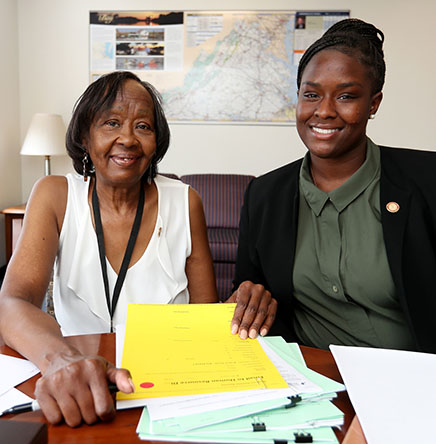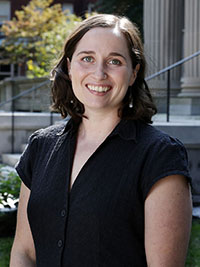Student Achievements
Whitney Brown named a 2021 Governor’s Fellow

Whitney Brown, a second-year graduate student in public administration at the Wilder School, was selected to participate in the Virginia Governor’s Fellows Program. Established in 1982, the program is an intense, eight-week internship within the state’s executive branch for rising college seniors, recent graduates or enrolled degree candidates in a graduate or professional school. The 25 fellows are selected through a highly competitive process and assigned to one of Virginia’s 15 cabinet-level departments, where they attend events with senior-ranking public and private sector leaders and assume responsibility on important statewide and departmental initiatives.
Brown was paired with the administration secretariat, which oversees five state agencies, including the Department of Elections, Department of General Services and Virginia’s information technologies agency. “It was a tremendous experience to share a space with some of the commonwealth’s brightest leaders and learn more about both the visible and ‘behind the scenes’ work that goes into executing state-level government responsibilities,” Brown said.
Brown worked on several COVID-related policies and employee engagement initiatives for the state workforce. “My classwork at the Wilder School — especially the one taught by Dean Gooden on equity and pandemic — as well as the personnel and financial management classes, prepared me well for my fellowship assignments,” she said. The fellows also have a group project. Brown’s group examined the pros and cons of students becoming voting members of their college and university’s board of visitors.
“Whitney is fearless, and that has served her well,” said Secretary of Administration Grindly Johnson. “She has taken
it upon herself to meet all of the agency heads under this secretariat and the House Clerk. She just jumped right into the work of the office. Whitney has a bright future in public service.”
At the conclusion of her summer fellowship, Brown was asked to stay on in the secretary of administration’s office, serving as a special assistant. “I’d like to work in the executive branch when I graduate in May 2022,” Brown said. “The fellowship is letting me see how important this work is.”
Among her other achievements as a graduate student, Brown participated in the international 2021 NASPAA-Batten Simulation Competition, where she placed third and was the recipient of the 2021 Edward E. Willey Graduate Award for Excellence. She also has been inducted into Pi Alpha Alpha, the National Honor Society for Public Affairs and Administration.
Gulak Award recipient Amelie Rives embracing community connections

Amelie Rives’ undergraduate degrees in sociology and anthropology sparked her interest in equity and social issues. She worked for a year with AmeriCorps, then held a series of nonprofit jobs in the Roanoke, Virginia, area, focused on helping people of limited means with their finances through credit and budget counseling. But Rives knew she wanted to do more. She wanted to understand how to impact the financial and housing challenges she saw through her clients.
“I became interested in learning more about housing and evictions and wanted to learn more about the RVA Eviction Lab,” Rives said. “I met Wilder School faculty Kate Howell, Ph.D., and Ben Teresa, Ph.D., on a tour of the Wilder School, and they opened my eyes to how holistic planners’ work is. I knew then that I wanted to come to Richmond and the Wilder School to earn my master’s degree in urban and regional planning.”
Rives was a Wilder Fellow who spent her first year at the RVA Eviction Lab and this year working at Virginia Community Capital. Her work at VCC centered on tackling how to track intersectional issues, such as making infrastructure accessible to affordable housing communities so that residents have access to transportation, groceries and child care.
Rives is a recipient of funding from the Gulak Endowment, named for Morton B. Gulak, who helped create the Regional and Urban Planning Department and was a beloved VCU faculty member for nearly 40 years. The endowment was created by Gulak’s family and supporters after his death in 2012. In addition to directly supporting students like Rives, the Gulak Endowment also supports lectures that bring national speakers to campus.
“Professor Gulak was a visionary and had a clear vision for what design and planning should be,” Rives said. “I’m excited to be a part of his legacy with this scholarship.”
Gulak taught his students the importance of planners’ understanding and interactions with the community. Rives used the funding to support her work on her graduate professional plan for Virginia Community Voice. The Richmond-based organization works to give voice to residents in the southside Richmond highway corridor, a historically Black and brown community working to improve its housing and infrastructure. “I believe in their work, and I believe Professor Gulak would have, too,” Rives said.
First Witzig criminal justice scholarship awarded to Kaitlyn Summers
Like so many college students, Kaitlyn Summers faced even greater financial stress after COVID-19 hit. The first-generation criminal justice major was furloughed from her job but remained determined to finish her studies. “It was such a relief when I learned I had been selected for the Witzig Scholarship,” she said. “With the pandemic, I really needed the help. It is truly a blessing.”
Eric Witzig (M.S.’95/GPA) fully endowed the undergraduate scholarship in criminal justice before his death in 2020. After a storied career of more than 40 years with the Washington, D.C., police and the FBI, Witzig was passionate about helping the next generation of criminal justice professionals, particularly first-generation students. Summers was the first student to receive the scholarship. “I am truly honored,” she said. Her interest in criminal justice goes back to middle school, when a close family member was fighting substance abuse and was often incarcerated. “I saw firsthand the impact of incarceration and wanted to understand more,” Summers said.
The dean’s list student graduated in May with a double major in criminal justice and sociology. She is looking at continuing with school, working in local policing or getting a job in state government. She is grateful her senior year was made easier through
the generosity of Eric Witzig.
Fall 2021 / In this issue
- Letter from the dean's office
- Dean Gooden: Leading with urgency
- At 90, Gov. L. Douglas Wilder not slowing down
- Equitable COVID-19 relief
- Faculty spotlight: Brittany "Brie" Haupt
- Faculty and alums achievements
- Professor emeritus marks 100 years
- Nancy Stutts’ vision and impact
- Alumnus spotlight: Anthony Starke
- Verbatim
- Student achievements
- 2021-22 Wilder Fellows